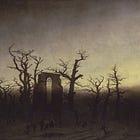Recognizing the Narrative, Part I: Palestine, as told by Isabella Hammad
The Parisian, Enter Ghost, and anagnorisis
In the past month, I have become an unequivocal fan of Isabella Hammad. I will read everything she writes. I am already awaiting the day that we get the announcement of her next book. I hope, as I write this essay, that I can convince you to read her work (this essay is free of major spoilers!)
Before diving into Hammad’s oeuvre, I wanted to take this moment to share that for a limited time, we are offering discounted paid subscriptions that will last a whole year.
The essays that arrive in your inbox and take 5-10 minutes to read take us hours to research and construct, in addition to the time spent on our podcast. We love this work and are happy to do it — but if you find our work valuable, it would mean so much to us if you would upgrade to a paid subscription. Your support would enable us to expand our work and spend more time on improving it.
If you are not in a position to contribute financially, please consider sharing this newsletter with your friends and family, leaving us a 5-star rating and review on your podcast player, and sharing our podcast and newsletter on social media.
Isabella Hammad is a British-Palestinian author, whose Palestinian father hailed from Nablus, a city that provides the setting for her first novel, The Parisian. Hammad herself grew up in West London and arrived onto the literary stage with a bang: in 2019, on the tail of her first novel, she was honored in “5 under 35” by the National Book Foundation.

Her books, thus far, have revolved around a Palestine of the past and of the present; but her writing, characters, and themes have universal appeal.
The narrative drive in her writing, whether she is writing novels or essays, is strong — she clearly has clear convictions about what the purpose of narrative is, and what narrative can do (something that, incidentally, Edward Said thought too).
In her essay Recognizing the Stranger: On Palestine and Narrative,1 Hammad writes about the Palestinian struggle, the waves of history, and the power of narrative. As she constructs her argument, she references Sophocles and James Joyce, but also Palestinian writers including Mahmoud Darwish and Ghassan Kanafani.
Hammad writes, initially, about narrative as a structure that builds towards a moment of recognition:
"All writers have tics, a particular repertoire of moves that recur: mine is probably the construction of recognition scenes, or moments of what Aristotle in his Poetics called anagnorisis… he gave the word anagnorisis to the moment when the truth of a matter dawns on a character, that moment toward which a plot usually barrels, and around which a story's mysteries revolve."
— Recognizing the Stranger, Isabella Hammad (emphasis my own)
As I read these words, I thought back to my experience reading her first novel, The Parisian. Neha and I discussed the book together on the podcast last week, and my only qualm in an otherwise sprawling, enjoyable, novel, was its ending. It felt, on my first reading, that the book’s ending was too neatly tied up in a bow; that everything came full circle somewhat artificially.
But now, having read her thoughts on that moment of recognition, I realize what she was trying to do in The Parisian. A few weeks of reflection allowed me to re-evaluate the structure of the novel, forcing me to appreciate the somewhat dramatic twists that can only lead to meaning in a work of art.
"We look back on our lives, or on the course of history, and according to the shape of the particular narrative we are telling we can say — ah, see, that is how the course of the story developed, and that was a key node when everything changed."
— Recognizing the Stranger, Isabella Hammad
When I picked up her second novel, Enter Ghost, I found that it takes a completely different approach to the novel. Where The Parisian is long, slow, and sprawling, Enter Ghost is tight, suffocating, and tense. The Parisian is set in a bygone past, while Enter Ghost is uncomfortably close to the present day. And yet, both books ask similar questions about past and present, exile, language, recognition, and knowability.
Enter Ghost is closely bound to Hamlet, Shakespeare’s famous play about revenge, power, and insanity. There is a pivotal moment of recognition in Act I, Scene 4 of Hamlet, in which the Ghost reveals to Hamlet the crucial backstory — having now read Enter Ghost, I feel that I have unlocked new meanings in these words.
HAMLET Speak. I am bound to hear.
GHOST
So art thou to revenge, when thou shalt hear.
GHOST I am thy father’s spirit,
Doomed for a certain term to walk the night
And for the day confined to fast in fires
Till the foul crimes done in my days of nature
Are burnt and purged away. But that I am forbid
To tell the secrets of my prison house,
I could a tale unfold whose lightest word
Would harrow up thy soul, freeze thy young blood,
Make thy two eyes, like stars, start from their
spheres,
Thy knotted and combinèd locks to part,
And each particular hair to stand an end,
Like quills upon the fearful porpentine.
But this eternal blazon must not be
To ears of flesh and blood. List, list, O list!
If thou didst ever thy dear father love—
HAMLET O God!
GHOST
Revenge his foul and most unnatural murder.
HAMLET Murder?
GHOST
Murder most foul, as in the best it is,
But this most foul, strange, and unnatural.This is the anagnorisis that Aristotle speaks of, which Hammad is so drawn to.
But there is no similar moment in her novel, Enter Ghost. The characters intermittently suspect and remember, but fail to ultimately recognize their own past and how it has resulted in the present.
Ghosts abound, in this book: ghosts of the past that encroach on and overshadow the present, even without explicit reference. Sonia, the protagonist, cannot escape the ghosts of her past romantic relationships, and her family’s fractured familial bonds. She plays Gertrude — a mother — in the West Bank’s production of Hamlet, and is all the while haunted by the very fact that she is not a mother.
The past encroaching on the present is a driving theme of The Parisian, too: in the wake of World War I, with the dissolution of the Ottoman Empire, Palestinians no longer know who they are or where they belong; the arbitrary decisions made by external colonial forces last well into the next century. And, on a more personal level, the story is heavily based on Hammad’s grandfather, Midhat Kamal.
The idea of recognition comes up again and again, in so many ways, in her books. In Enter Ghost, when lines of Hamlet appear on the page, it is not in their original Shakespearean English; it is an Arabic version translated by Jabra Ibrahim Jabra, which have then been translated back into English. What results is a vague sense of recognition in the lines of the play, without an immediate diagnosis of their meaning. It is a brilliant choice that at once alienates the reader while also bringing them closer to the true meaning of the words.
In The Parisian, too, translation and language become important as the various characters, from different regions and nationalities, are thrown together, and speak in an admixture of English, Arabic, and French. And Midhat, in the story, is never fully at ease when he has to communicate in French.
And yet, despite this motif of recognition, and the many ways in which it is employed, Hammad has grown as a novelist since her first book. In Enter Ghost, she blurs the idea of recognition as the book goes along, until, at the end, we realize that most of the questions that the book raises remain unanswered.
Hammad is aware of this effect that she has created. In Recognizing the Stranger, she writes:
“This is the most I think we can hope for from novels: not revelation, not the dawning of knowledge, but the exposure of its limit.”
It is precisely because she subverts the expectation of a revelation that the ending, in its ambiguity, works. She resists the urge to be too clever, building her craft to a level higher than what she displayed in her first novel – and Enter Ghost is a stronger book for it. Whether or not Hammad has her own conclusions about the characters, or the book’s ending, she doesn’t share them with the reader.
“Perhaps a writer doesn’t need to have a clear sense of what her text will do in the world. Perhaps a writer can relax a bit. Perhaps it’s enough to ask a question, and hope, perhaps, to glimpse the meaning of that question in retrospect.”
— Recognizing the Stranger, Isabella Hammad
This essay on Hammad’s works has been all about the idea of recognition, exploring its individual, social, and metaphysical aspects. Stay tuned for Part II next week, which will deal with recognition on the level of diplomatic viewpoints and international interests.
— Shruti
If you can’t get enough of Isabella Hammad:
Isabella Hammad’s (Incomplete) Essential List of Books About Palestine [Lithub]
The Revolutionary Power of Palestinian Theater — Isabella Hammad [Lithub]
"This hostility to theater perhaps had to do with its transitory nature: as a live, essentially unrepeatable art form, theater can be unpredictable and even volatile."
“The Parisian” Weaves Family Stories and Palestinian History Into a Debut Novel — An interview with Isabella Hammad [Electric Literature]
Isabella Hammad on Enter Ghost — An Interview [Folger Shakespeare Library]
The Novel Tea Podcast: Updates
Be sure to check out our full discussion of The Parisian, in which we talk about the book through the themes of belonging and edification. We reflect on the characters, share some important historical context, and attempt to answer the question: will this book stand the test of time?
Yesterday, we wrapped up Season 4: Beyond Borders with a thematic discussion about the eight books we read over the past few months. We discussed our favorite (and least favorite) reading experiences, talked about themes that emerged, and shared some insights from Edward Said.
And finally: we can’t finish the year without sharing our top ten books of the year! Keep an eye out for our final episode of 2024: “2024 in Books: Our Top Ten, New Releases, and More”
Thank you, as always, for being a dedicated reader of The Novel Tea Newsletter. Happy holidays to you and your loved ones — we can’t wait to see what 2025 has in store for us!
Henceforth referred to as Recognizing the Stranger






